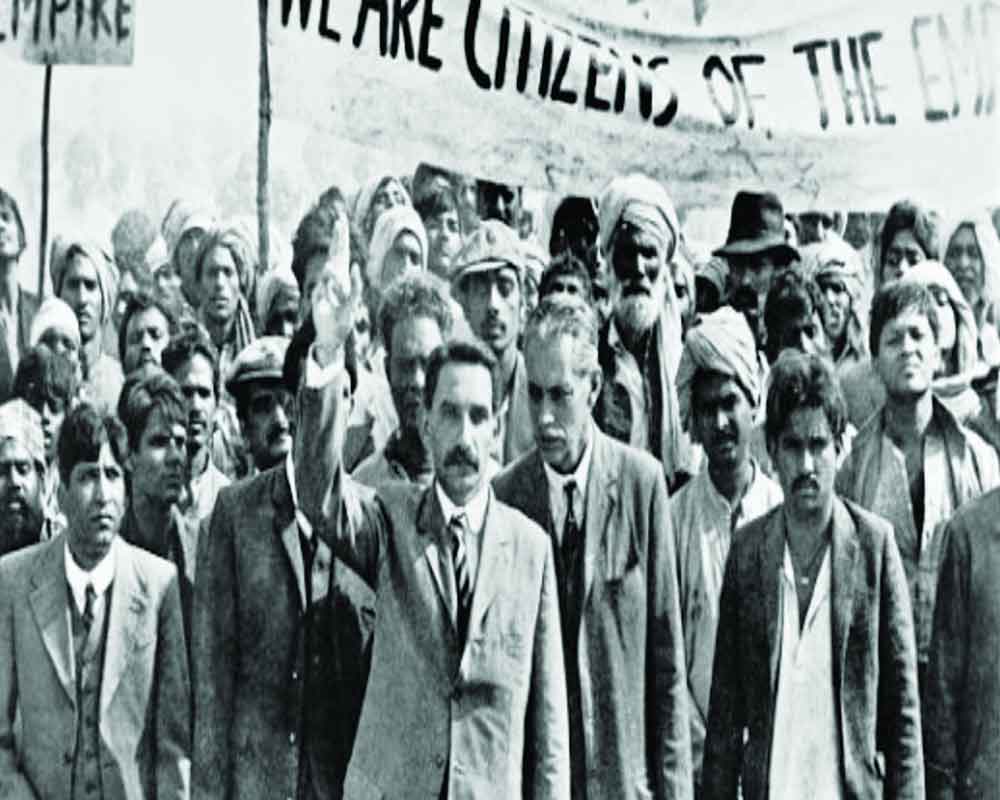Gandhi ji's experiments with truth continued throughout his life as did his perseverance to purge him of all defilements
The life of MK Gandhi is the unique saga of a
person; pure in heart, word, and deed, one who was consistently, consciously growing up. This author of "My Experiments with Truth' grew from 'truth to truth' and, as was inevitable in such a case, had no hesitation in changing his views and comprehension based upon new experiences and insights.
In the current national political scenario, with elected representatives and 'leaders' changing sides and dumping their so-called ideological commitments without any hitch or hesitation, it may be relevant to point out how 'growing up has been stunted in the absence of a principled, value-based approach to public service. When one is committed to truth, the contrast becomes evident, so succinctly articulated by Gandhi Ji in the 'Harijan' of April 29, 1933: "I am not at all concerned to be consistent in my search after truth. I have discarded many ideas and learned many new things. Old as I am in age, I have no feeling that I may cease to grow inwardly or that my growth will stop at the dissolution of the flesh. What I am concerned with is my readiness to obey the call of truth, my God, from moment to moment". This
statement indicates the purity
in thought and words, as also
the transparency in approach and action. Only such a
person could proclaim
unequivocally that 'my life is
my message!
It may be worthwhile to recall two of the initial impacts young Barrister MK Gandhi encountered on his arrival in South Africa, one highly painful and humiliating, and the other so inspiring that it overhauled his approach to life. Both of these are well known, the first being so traumatic and
devastating that it could
unsettle any mature person.
The other is uniquely
transformative, inspiring enough to change the very course of Gandhi's life and living. His being thrown out
of the first class train compartment despite having a valid ticket simply because of his color, and subsequent human thrashing in a horse-drawn carriage again because of the policy of apartheid, hurt him immensely. Anyone who reads his description of these two in the autobiography would be rattled beyond words. When he was being slapped by a white man in the horse carriage, there were some Englishmen who protested and mentioned that as he had the ticket, he should be allowed to retain his seat, but that was of no avail.
He could discover positivity even during that episode! For a person who trusted in growing up, there was a realization: not all white men are inhuman, and not all of them support color
prejudice. Expand it: in every caste, color creed, and
religion, not all persons are the same!
Even before alighting from the ship for the first time on the shores of South Africa, he had witnessed how Dada Abdullah was being humiliated when had gone to receive him. The young Barrister, not yet familiar with all that sprung out of color prejudice, was upset, 'why Dada Abdullah' was suffering all that! It was only after the subsequent
personal agonies he suffered, a fresh realization dawned upon him, and that
expanded his horizons beyond self or individual
sufferings.
What if I get one or two persons punished for the pain and insult inflicted upon me? Generations have
suffered for no fault of theirs; they were forced to lead a sub-human life, for no fault of theirs! Why should I not fight against the widespread inhuman malice? And his entire struggle - and stay in South Africa - was a consequence of the thought process that emanated from these tragic experiences. An American Dr. Mote once asked Gandhi Ji: "What was the most creative incident in your life?" To this Gandhi Ji replied that there were
several that he could recall as the most significant creative incidents in his life.
However, the most
creative one was
the throwing out of the
railway compartment at Pietermaritzburg! It was at Pietermaritzburg Mohandas Gandhi realized "any indi
vidual who lies or is unjust is most scared of his lie or injustice being found out"! And from the womb of fear, cruelty is born! The seeds of the first principle of Satyagrah were born here: The malice; he realized; is deep and such a person is indeed 'diseased'!
So, this person must be treated with care, treated on a human level, and cured! Why have any prejudices towards him? Maybe the seeds of his great conviction 'hate the sin, and not the
sinner' were sown during the churning of ideas at that stage. Generations ahead shall continue to study and analyze Gandhi.
The two instances cited above are often casually recalled, but these probably deserve a far deeper comprehension and conviction given their strength and potential. One could conclude with the words of Narayan Desai: "It is possible that if we want to bring about social change by the methods that Gandhi gave us, it is a mental challenge. Let us accept it." And this is not a small challenge; it is the only alternative in times of the global realization that for the survival of humanity and the planet earth, we have to 'learn to live together!
(Professor Rajput works in education, social cohesion, and religious amity. The views expressed are personal)


























